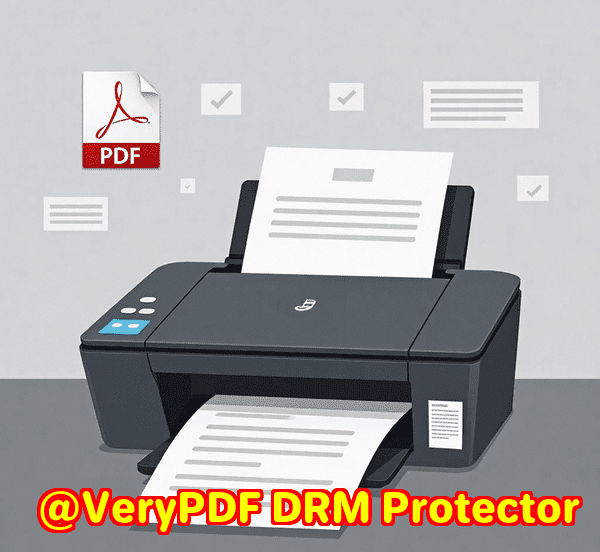Why Developers Prefer VeryPDF SPLParser for Offline Document Conversion SDK Solutions
Every time I dive into a project involving batch document conversion or printer spool file analysis, I hit the same snag: finding a reliable, offline tool that handles PCL, PS, and PDF files without a hiccup. If you’ve wrestled with clunky, cloud-dependent converters or SDKs that demand heavy integrations and obscure settings, you know the pain.

That’s exactly why I was drawn to VeryPDF SPLParser Command Line and SDK for Developers Royalty Free. This tool isn’t just another PDF converter. It’s designed to parse and convert print spool files (PCL, PS, PDF, SPL) efficiently, right on your local machine no internet required, no distractions.
For developers working with printing systems, legacy document formats, or large-scale document workflows, SPLParser is a real game changer. Let me walk you through how I put this tool to work, why it stands out, and why I recommend it for offline document conversion SDK solutions.
What is VeryPDF SPLParser and Who Should Use It?
At its core, VeryPDF SPLParser is a command line utility and SDK that parses and converts PCL, PostScript (PS), and PDF files, plus printer spool (SPL) files.
This means developers can automate or integrate document conversion and processing into their apps or backend workflows, whether for printing environments, document archiving, or digital transformation projects.
It’s perfect for:
-
Software developers building print management or document automation systems
-
System integrators handling legacy print data and needing conversion tools
-
IT teams managing bulk document workflows in secure offline environments
-
Print service providers wanting to manipulate print jobs before output
I found it especially useful when dealing with spool files from different printers, and converting specific pages to images for previews.
How I Use SPLParser: Real Features That Matter
1. Command Line Power for Complete Control
The command line nature of SPLParser means I can script and automate complex tasks without opening a UI or relying on third-party software. That’s huge for batch jobs or integrating with server systems.
You can easily:
-
Extract document info (
-info) from PCL, PS, or PDF files -
Convert specific pages (
-firstpageand-lastpage) to PNG images for quick previews -
Set output image resolution (
-dpi) and color depth (-bitcount)
For example, I once needed to generate thumbnails of the first page of hundreds of PostScript files. A simple command like this did the trick perfectly:
This kind of precise control saved me hours compared to slower, GUI-based converters.
2. Updating Print Properties Without Complex Software
One standout feature I didn’t expect to love but ended up relying on was the ability to update print properties directly in PCL and PS spool files.
You know how sometimes you get handed a print job but need to tweak settings like switching from simplex to duplex, changing the number of copies, or adjusting resolution?
With SPLParser, you can do all that right from the command line:
No need to reprint or open heavy design software.
This is a massive time saver when processing large volumes of print jobs for clients or internal departments.
3. Detailed Document and Color Analysis
The tool also extracts document metadata and does page-by-page color analysis. This came in handy when we needed to understand print jobs better figuring out which pages were colour versus monochrome, and their sizes.
Running:
provides insights like:
-
Document title
-
Number of copies
-
Duplex or simplex setting
-
Color mode of each page
This transparency helps catch errors early or optimise print workflows by filtering colour pages for specialised processing.
Why SPLParser Beats Other Offline Conversion SDKs
Before SPLParser, I tried a handful of similar tools. Here’s why this one stuck:
-
Royalty-Free SDK Licensing: Developers get more flexibility without recurring fees.
-
Robust Support for Legacy Formats: PCL and PS files aren’t always easy to parse. SPLParser handles PCL-XL, PCL5, and PostScript with high fidelity.
-
No Internet Dependency: Great for secure environments where uploading files to cloud converters is off-limits.
-
Command Line Simplicity: Powerful but easy to script. No unnecessary UI layers or bloat.
-
Update Print Job Properties: Most converters focus on read-only conversions. The ability to tweak spool file properties is unique.
-
Speed and Efficiency: Large batch jobs run fast with low overhead.
It’s clear VeryPDF built this tool with developers and system admins in mind, not casual users.
Where SPLParser Shines: Use Cases I’ve Seen
-
Print job auditing and modification: Updating duplex and copy counts on PCL and PS files before sending them to printers.
-
Document preview generation: Converting first pages of large PDF and PostScript batches into thumbnails.
-
Legacy system integration: Parsing and extracting info from older printer spool files for digital archiving.
-
Print workflow automation: Automating processing of mixed-format print jobs without human intervention.
-
Colour vs monochrome sorting: Using colour analysis to decide which jobs need special handling or cost allocation.
If you’re in any environment dealing with PCL, PS, or PDF print files offline, this tool will save you headaches and hours of manual work.
My Takeaway and Recommendation
After integrating VeryPDF SPLParser into several projects, I’m convinced it’s an essential tool for developers handling offline document conversion SDK needs.
It cuts through the noise by delivering:
-
Flexible command line operation for automation
-
Deep support for complex print formats
-
Unique features like print property updates
-
Speed and no internet dependency
If your work involves parsing or converting spool files or PDFs offline, I’d highly recommend giving SPLParser a spin.
It’s saved me tons of time and frustration, especially when working under tight deadlines or in locked-down IT environments.
Start your free trial now and boost your workflow: https://www.verypdf.com/
Custom Development Services by VeryPDF
Sometimes off-the-shelf tools don’t cover every unique technical challenge.
That’s why VeryPDF offers custom development services tailored to your specific needs.
Whether you need:
-
Custom SDKs for Linux, macOS, Windows, or server environments
-
Utilities based on Python, PHP, C/C++, or .NET
-
Virtual printer drivers generating PDF, EMF, or images
-
Tools for capturing and monitoring printer jobs in various formats
-
API hooking layers for Windows to intercept file or print activity
-
Advanced document format processing for PDF, PCL, PRN, PostScript, EPS
-
Barcode recognition, OCR, and table extraction for scanned TIFF/PDF
-
Cloud-based document conversion and digital signature solutions
-
PDF security, DRM, font, and printing technologies
VeryPDF’s experienced team can develop solutions to fit your exact project scope.
Reach out through their support center at https://support.verypdf.com/ to discuss your requirements.
FAQs
Q1: Can SPLParser convert only certain pages from a PDF or PS file?
Yes, you can specify the first and last page to convert using -firstpage and -lastpage options.
Q2: Does SPLParser require an internet connection?
No, it’s fully functional offline, making it ideal for secure environments.
Q3: Can I update print properties like duplex mode or copies in spool files?
Yes, SPLParser allows you to update duplex settings, number of copies, resolution, and job names in PCL and PS files.
Q4: Is SPLParser suitable for high-volume batch processing?
Absolutely. It’s designed for command line automation and efficient batch workflows.
Q5: What programming languages are supported for SDK integration?
VeryPDF provides SDKs and custom development for Python, PHP, C/C++, C#, .NET, JavaScript, and more.
Tags
-
offline document conversion SDK
-
PCL to PNG conversion
-
PostScript parsing command line
-
print spool file manipulation
-
VeryPDF SPLParser review
